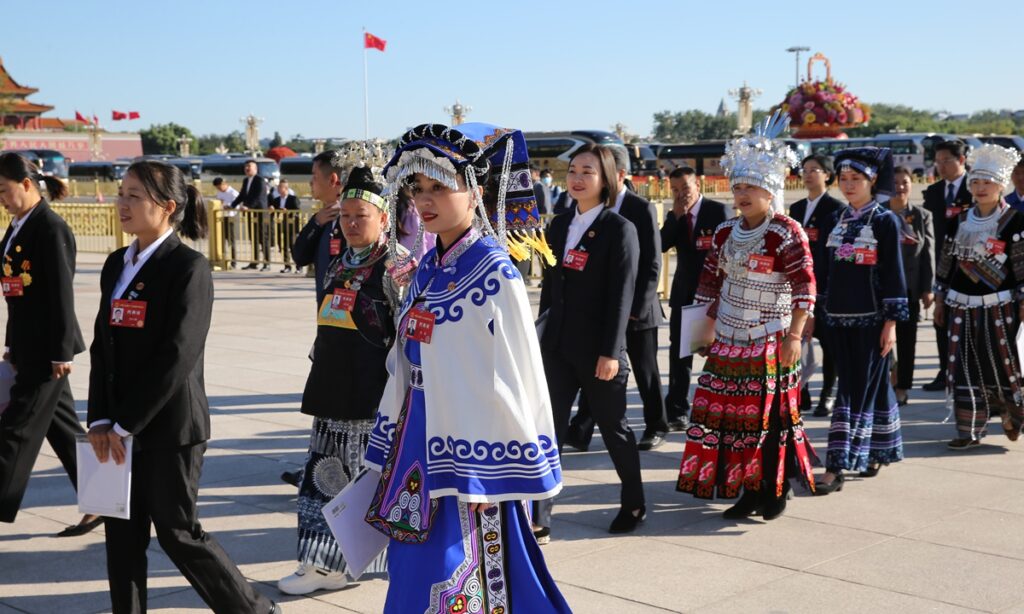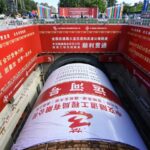The 18th National Congress of the All-China Federation of Trade Unions (ACFTU) opened in Beijing on Monday, gathering more than 2,000 delegates representing millions of Chinese workers in various industries to discuss how to improve workers’ welfare and to mobilize them to better China’s economy and development.
A giant banner hung on the second-floor balcony of the Great Hall of the People, where the opening ceremony was held. It reads: “Organize and mobilize hundreds of millions of workers to strive for building China into a modern socialist country in all respects and promoting the great rejuvenation of the Chinese nation.”
Chinese President Xi Jinping, also general secretary of the Communist Party of China (CPC) Central Committee and chairman of the Central Military Commission, attended the event, the Xinhua News Agency reported.
The meeting was also attended by other leaders of the CPC and the state, including Zhao Leji, Wang Huning, Ding Xuexiang and Li Xi, all of whom are members of the Standing Committee of the Political Bureau of the CPC Central Committee.
During a speech delivered on behalf of the CPC Central Committee by Cai Qi, also a member of the Standing Committee of the Political Bureau of the CPC Central Committee, Cai offered warm congratulations to the meeting and extended sincere greetings to all workers and trade union cadres across the country, encouraging the Chinese working class to actively participate in the construction of a powerful country and the rejuvenation of the nation.
Trade unions at all levels must also remain loyal to the Party’s cause, serve the country’s workers wholeheartedly, build broad unity and effectively improve the quality of rights protection services, Cai said.
The event reviewed the achievements and experiences of trade unions in the new era and advocated for the cultivation of a spirit of labor and craftsmanship, as well as the recognition and support given to labor models.
The congress also submitted an amendment for the Constitution of ACFTU and a financial report to the delegates for review.
Delegates come from a wide range of industries, from the railway and civil aviation sectors to finance and trade, and even water conservancy and meteorology.
“The presence of China’s top leadership at the opening event of the 18th National Congress of ACFTU shows the country’s high emphasis on the working class and the work of trade unions. I’m greatly touched and feel great responsibility,” Tan Qinzhi, a delegate and wage negotiation instructor at the trade union for the Furong district in Changsha, Central China’s Hunan Province, told the Global Times on Monday.
As part of her trade union work, during the past 10 years she has guided enterprises to sign more than 1,500 collective agreements on wages involving more than 80,000 employees and has paid more than 800 door-to-door visits to assist more than 160 enterprises with more than 100 employees.
Tan said she’ll continue to safeguard workers’ fundamental interests by promoting collective wage negotiations among employers and improving the incentive mechanism for the remuneration of skilled workers.
“I have raised a proposal aimed at mobilizing grassroots trade union cadres and enhancing their capacity to perform their duties because they are directly in contact with ordinary workers,” said Tan.
“Rights protection is the basic duty of trade unions. Together with my team, I will further contribute to the union’s system of rights protection in accordance with the law,” Zhang Shiliang, a delegate and lawyer who has set up a legal aid service team to help migrant workers and laborers in new jobs, told the Global Times on Monday.
Zhang said he has proposed a comprehensive reform of industrial worker training by improving the skill standard system, bettering the welfare of industrial workers, and increasing publicity to stimulate more workers, especially the younger generations, to improve their skills, and foster more highly skilled workers and craftsmen.
Among the delegates, grassroots and frontline workers accounted for 68.3 percent, a 3.2 increase compared with the 17th congress in 2018. The group representing workers from new economic and social organizations, or engaged in new forms of employment made up 22.4 percent, which experts say further enhanced the diversity and representativeness of the participants.
Besides the delegates, nearly 50 specially invited delegates and 48 guests from the special administrative regions of Hong Kong and Macao also participated in the congress.
(Global Times)




